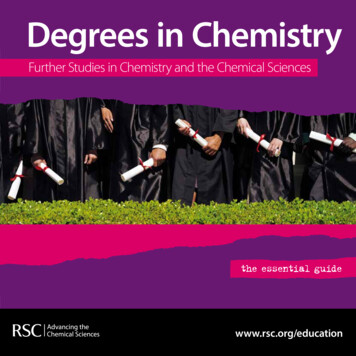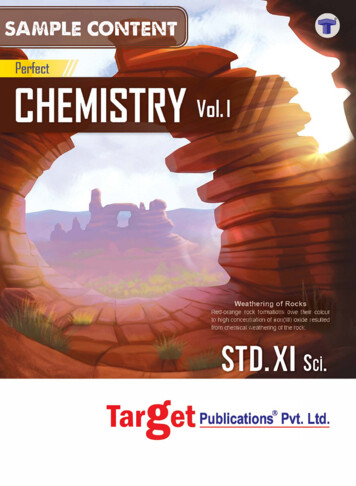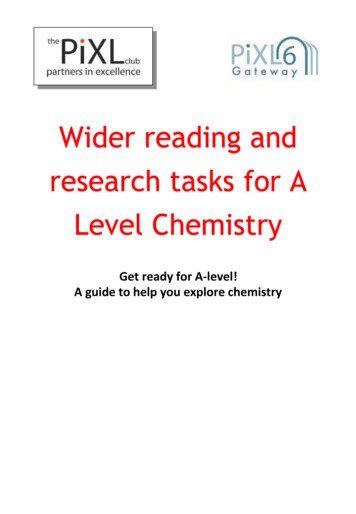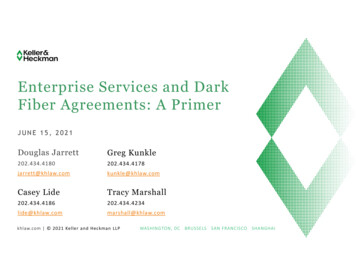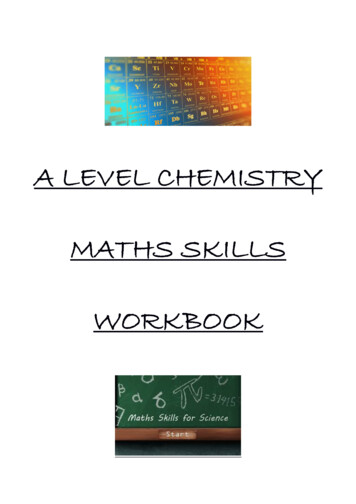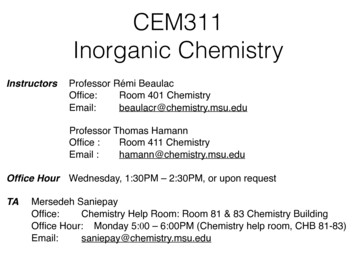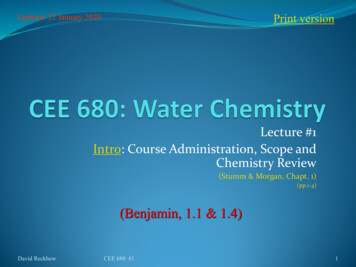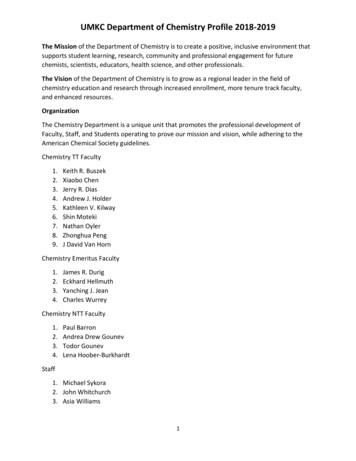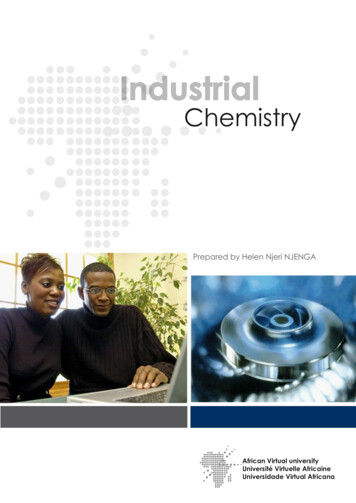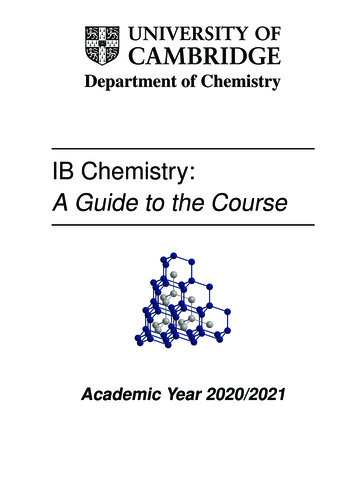
Transcription
Chemistry 434Fall 2016Advanced Analytical Chemistry - InstrumentalMethods of AnalysisCourse Organization, Lecture Syllabus and Other Important InformationLectures:Monday, Wednesday, Friday 1:50 to 2:40 pm,Location:136 CEMRecitation:Friday, 9:10-10:00 AM, 183 CEMFriday, 3:00-3:50 PM, 136 CEMCourse 34/Required Text:D.A. Skoog, F.J. Holler and S.R. Crouch, Principles of InstrumentalAnalysis, 6th Edition, Thomson Brooks/Cole Publishers, 2007.Instructor:Professor Greg M. Swain314 Chemistry BuildingTel. 355-9715 x229Email: swain@chemistry.msu.eduInstructor Office Hours: Wednesday, 1:00 to 2:00 pm, 314 Chemistry, or by appointment.TA:Stephen Baumlerbaumler@chemistry.msu.eduTA Office Hour:TBACourse DescriptionThis in-depth course covers the design, operational principles and practical application ofmodern instrumental methods used in chemical analysis. Instrumental methods are commonlyused for the separation, identification and quantification of the chemical components of naturaland artificial materials. Using a combination of problem-based learning approaches, case studiesand traditional lectures, the student will develop critical thinking skills in the areas of instrumentdesign and selection, method development, and data analysis/interpretation.Course Objectives1.Understand the basic design and operating principles of some modern instrumentsused in chemical analysis, specifically separations, optical spectroscopy, electroanalytical1
2.3.4.5.6.methods, material characterization and surface analysis techniques, and analytical massspectrometry.Understand the basics of experimental design and the use of statistical analysis toevaluate measurement data.Understand how to design experiments using these instruments to solve problems inchemical analysis.Learn how to use databases to search for scientific literature and how to read a scientificpaper.Improvement of written communication skills through the preparation of a literaturebased research paper on a current topic in analytical chemistry.Improvement of oral communication skills through delivering an oral presentation, aspart of a team, on an assigned case study.Course OrganizationSection A: Foundations (Analytical Chemist’s Toolbox)Chapter 1 – Method selection, detection figures of merit and response calibrationChapter 5 – Instrumental electronics and signal processingExperimental design and sample preparation (lecture notes only)Statistical data analysis (lecture notes only)Section B: SeparationsChapter 26 – Theory of separationsChapter 27 – Gas chromatography (environmental analysis)Chapter 29 – Normal- and Reversed-phase liquid chromatography (bioanalysis)Chapter 30 – Capillary electrophoresis (single cell analysis)Section C: SpectroscopyChapter 8 – Atomic absorption spectroscopyChapter 9 – Atomic emission spectroscopy – ICP (water quality analysis)Chapter 13,14 – Molecular UV/Vis spectroscopyChapter 15 – Molecular luminescence spectroscopy (bioanalysis)Chapter 16, 17 – Infrared spectroscopy (tissue imaging)Chapter 18 – Raman spectroscopy (polymer characterization)Section D: Electroanalytical ChemistryChapter 23 – Potentiometry and probes (biomedical analysis)Chapter 25 – Analytical voltammetry (chemical sensing)Section E: Additional TopicsChapter 21 - Material and surface analysis techniques (polymers and nanoscale materials)Chapter 20 – Advanced topics in MS: understanding the experiment (biomolecules)Chapter 19 – Advanced topics in NMR: understanding the experiment (biomolecules)Exam ScheduleOctober 5thOctober 31st(Exam 1 – in class)(Exam 2 – in class)2
November 30thDecember 12th(Exam 3 – in class)(Final Exam – 12:45-2:45 PM, Room 136)GradingThere are a total of 800 points available for this course:Ten weekly quizzes Given during RecitationThree 1-h exams worth 100 points eachFinal Exam ComprehensiveTerm PaperOral presentation – Case Study(10 pts. each, 100 points total)(300 points total)(200 points total)(100 points total)(100 points total)Grading ScaleThe scale indicated below is based on the number of total points accrued being converted to apercentage of the total points available. These grade cut-offs are based on historical experiencewith this course and they may be relaxed by a small amount, at the instructor’s discretion, basedon the class exam results. In no event shall the grade levels be made more stringent thanindicated below.Raw score (1000 max)720 – 800680 – 719640 – 679600 – 639560 – 599520 – 559480 – 519 480Percentile score90.0 – 100%85.0 – 89.9%80.0 – 84.9%75.0 – 79.9%70.0 – 74.9%65.0 – 69.9%60.0 – 64.9% 60%Course grade4.03.53.02.52.01.51.00HomeworkProblems will be assigned but not collected for any credit or grade. Answer keys will be postedon the course website. The Friday recitation section will be a place to ask any questions you haveabout the homework for that week. The Recitation period will be used to work selected problemsfrom time to time. Questions can also be addressed to the Instructor after class, during thescheduled office hour or a scheduled meeting.Lecture ScheduleLecture notes will be posted on the course website.It is expected that the Required Reading for each week will be completed prior to the startof that week’s class. All exams will cover material in the text, some of which may not beextensively discussed in the lectures, case study material, assigned problems and lecturenotes!!3
WeekLecture TopicAug. 31 andSept. 2Sept. 7 and 9Method selection, detectionfigures of merit and calibrationInstrumental electronics andsignal processing/ExperimentaldesignSample preparation/Statisticalanalysis of dataTheory of separations/Gas phasechromatographySept. 12-16Sept. 19-23Sept. 26-30Oct. 3-7Oct. 10-14Oct. 17-21Oct. 24-28Oct. 31- Nov.4Nov. 7-11Nov. 14-18Nov. 21 and23Nov. 28-Dec.2Dec. 5-9Dec. 12(Mon.)ChapterNormal- and Reversed-phaseliquid chromatographyCapillary electrophoresisEXAM 1 Oct. 5thAtomic absorption/Atomicemission spectroscopy - ICPMolecular UV/Vis/Molecularfluorescence spectroscopyInfrared spectroscopy/RamanspectroscopyExam II Oct. 31stPotentiometry and probesPotentiometry andprobes/Analytical rizationMaterial characterizationProblems1CaseStudy(Fridayclass)C1 – 1,7,8,9,10 None5C5 – 1,2,4-10NoneAppendix 1NoneGroup 1C26 –2,5,6,7,10C27 –1,3,6,13,15,2028C28 –2,5,13,20,2230C30 –1,2,5,6,7,99 and 10C9 – 2,3,5,6,8C10 – 2,5,613, 14 and 15 C13 –1,5,8,9, 15C14 – 1,2,8C15 – 1,3,716, 17 and 18 C16 – 1,2,4,7,826 and 27Group 3NoneGroup 5Group 5Group 622 and 23C22 – 2,3,8,9C232,4,7,13,14None25C25 – 5,9,10Group 712Group 8C21 – 1-5Exam III Nov. 30thAdvanced topics: analyticalmass spectrometryAdvanced topics: NMR andFinal ReviewFinal Exam12:45-2:45 pmGroup 2NoneGroup 9C19 – 3-7,21,274Group 10
Research PaperYour first task will be to select a topic of interest to write about. You can get ideas from theliterature, for example, a feature or review article in the journal, Analytical Chemistry, or arelated analytical measurement journal. One you have identified a current topic in analyticalmeasurement science, you will need to search the literature for articles on that topic to use todevelop your paper. DO NOT SEARCH GOOGLE!! Search the scientific literature databases(Scifinder, Scopus, Web of Science and or Pubmed) through MSU Libraries for importantarticles on your topic. The main article for the paper should be one published within the pastthree years. However, there may be background literature on the topic that dates back more thanthe three years. Use of this material is fine.After gathering and reading the appropriate literature, you will need to do some critical thinkingand write your thesis statement down in one sentence. Your thesis statement is like a declarationof your belief. What is the purpose for the report? The main portion of your report will consistof arguments to support and defend this belief or position.You will then prepare an outline for the paper and have this reviewed by me before Oct. 3rd. Thepurpose of an outline is to help you think through your topic carefully and organize it logicallybefore you start writing. A good outline is the most important step in writing a good paper. Theoutline should include: (i) Introduction – brief comment leading into the subject matter, (ii) Bodyof the paper – (a) experimental approach and instrument design, (b) experiments performed, (c)data analysis, and (iii) Conclusions – summary of key points from the main paper.You will then write a 10-page literature-based research paper (Times Roman, 11 point, 1.5 linespacing) on the topic. The paper should utilize at least five references. The term paper shouldhave the following sections: Motivations for the Instrumental Method (what is it good for, whattypes of analyses are possible, and how does having the method benefit science?), Basics of theInstrument Design and Theory of Operation, Example Data and Interpretation, and Conclusionsand Future Prospects. All figures are to be scanned and embedded into the text. All text used inyour paper and written by another author should be appropriately cited. All papers are due on orbefore October 28th.Oral Presentation (Case Study)You will be assigned to a team of students (group of 3) and the group will prepare and present alecture on a case study you will be assigned. The case study will focus on one paper but you willhave to search the literature for associated and background articles needed to understand thework presented in the main paper. Go to MSU Libraries and search the scientific literaturedatabases (Scopus, Scifinder, Web of Science and or Pubmed)In this Case Study, you will discuss the purpose for the work, the design of the instrumentalmethod used and its operational principles, the data presented and the conclusions reached. Seethe syllabus for your presentation date.Religious Observances/ Other Absences from ClassIt is the responsibility of students who plan to be absent from class at certain times throughoutthe semester, due to religious holidays or other reasons, to make arrangements in advance with5
the instructor. Course notes or handouts may be obtained from the instructor if these conditionsare met. If a make-up exam is required, the instructor retains the right to determine the content ofthe exam and the conditions of administration, giving due consideration to equitable treatment.Academic HonestyAcademic dishonesty at Michigan State University is defined by the General Student Regulationsas conduct that violates the fundamental principles of truth, honesty, and integrity. The followingconduct is specifically cited:ooooSupplying or using work or answers that are not one's own.Providing or accepting assistance with completing assignments or examinations.Interfering through any means with another's academic work.Faking data or results.You are expected to complete all course assignments, including homework, quizzes, tests andexams, without assistance from any source. You may work together with your classmates oncourse material but submit your own work. You are expected to develop original work for thiscourse; therefore, you may not submit course work you completed for another course to satisfythe requirements for this course. Also, you are not authorized to use the www.allmsu.com orsimilar websites to complete any course work in this course.Students who violate these rules WILL be assigned a failing grade for the course.Social Media PolicyAs members of a learning community, students are expected to respect the intellectual propertyof course instructors. All course materials presented to students are the copyrighted property ofthe course instructor and are subject to the following conditions of use:1. Students may not record lectures or any other classroom activities and use the recordings onlyfor their own course-related purposes without permission from the instructor.2. If granted permission, students may share the recordings with other students enrolled in theclass. Sharing is limited to using the recordings only for their own course-related purposes.3. Students may not post the recordings or other course materials online or distribute them toanyone not enrolled in the class without the advance written permission of the course instructorand, if applicable, any students whose voice or image is included in the recordings.4. Any student violating the conditions described above may face academic disciplinarysanctions.Special Requestshttps://www.rcpd.msu.edu/6
Michigan State University is committed to providing equal opportunity for participation in allprograms, services and activities. Requests for accommodations by persons with disabilities maybe made by contacting the Resource Center for Persons with Disabilities at 517-884-RCPD or onthe web at the link shown above. Once your eligibility for an accommodation has beendetermined, you will be issued a verified individual services accommodation (“VISA”) form.Please present this form to me at the start of the term and/or two weeks prior to theaccommodation date (first test date). Requests received after this date will be honored wheneverpossible.7
Advanced Analytical Chemistry - Instrumental Methods of Analysis Course Organization, Lecture Syllabus and Other Important Information . assigned problems and lecture notes!! 4 Week Lecture Topic Chapter Problems Case Study (Friday class) Aug. 31 and Sept. 2 Method selection, detection figures of merit and calibration 1 C1 - 1,7,8,9,10 None
